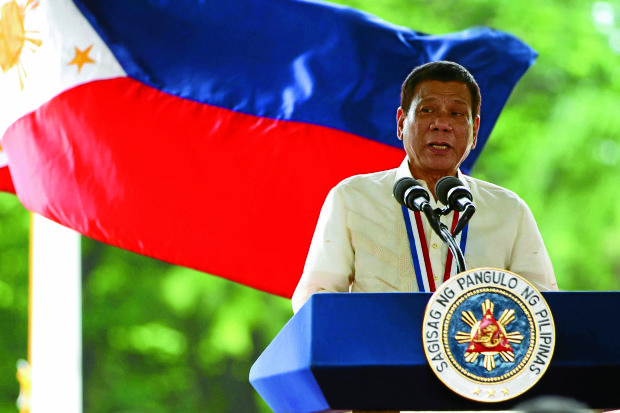President Duterte on Wednesday said he was ready to defend his take-no-prisoners war on drugs in a discussion of the human rights situation in the Philippines with US President Barack Obama in Laos next week.
Mr. Duterte said he was willing to meet with Obama on the sidelines of the East Asia Summit of the Association of Southeast Asian Nations (Asean) meeting in Vientiane on Sept. 6, but he would demand that he be allowed to first explain the context of his merciless crackdown on the illegal drug trade before engaging the US leader in a discussion of the human rights situation in the Philippines.
The White House on Monday said that Obama planned to raise US concerns over the extrajudicial killings in Mr. Duterte’s war on drugs when they meet in Laos.
The United States, United Nations and international organizations have expressed concern about the state of human rights in the Philippines as the body count mounts in Mr. Duterte’s brutal campaign to stem the illegal drug trade.
More than 2,000 drug suspects have been killed, nearly half of them in police operations, since Mr. Duterte took office on June 30 and immediately launched a drive to fulfill a campaign promise of killing tens of thousands of criminals and stamping out illegal drugs within six months of his presidency.
Asked on Wednesday if he was willing to discuss the rights situation with Obama, Mr. Duterte said, “It depends at what degree.”
‘Listen to me first’
“They must understand the problem first before we talk about human rights,” he told reporters at Ninoy Aquino International Airport, where he met 120 Filipino workers who had lost their jobs in Saudi Arabia.
“I would insist, ‘Listen to me. This is what the problem is.’ Then we can talk. No problem,” the President said.
“Avoid drugs at all costs because it could cost your lives, too,” he said to the laid-off migrant workers, adding that 3 million Filipinos are drug addicts.
Criticism by the US government, UN rights experts and human rights groups over the extrajudicial killings have provoked angry outbursts from Mr. Duterte, who, at one point, threatened to pull the Philippines out of the United Nations.
In profanity-laced tirades, he said the United Nations had failed to prevent genocidal killings in Africa and the Middle East, and the United States had failed to stop the killings of African-Americans by white police.
The United States has urged the Duterte administration to ensure that law enforcement efforts comply with human rights obligations in the crackdown on illegal drugs, which includes forcing the surrender of drug users and detaining them.
“We are concerned by these detentions, as well as the extrajudicial killings of individuals suspected to be involved in drug activity in the Philippines,” US state department spokesperson Elizabeth Trudeau said.
“We strongly urge the Philippines to ensure its law enforcement efforts comply with its human rights obligations,” she added.
The White House said Obama would also raise concerns about some of Mr. Duterte’s “recent statements” when they meet next week.
It was a reference to Mr. Duterte’s lashing out at US Ambassador Philip Goldberg, branding him a “gay son of a b*tch.”
The White House said, however, that there were also important security issues for Obama and Mr. Duterte to discuss, particularly tensions over freedom of navigation in the South China Sea.
China has been incensed by a ruling against its claims to almost all of the South China Sea by an international arbitration court, in an action brought by the Philippines.
Similarities with Putin
Mr. Duterte is also expected to meet with Russian President Vladimir Putin in Laos.
“That I look forward to,” he said. Asked why, he said he liked Putin more.
“We have a lot of similarities,” he said.
Asked what similarities, he replied: “Maybe when it comes to girls.” With reports from the wires
